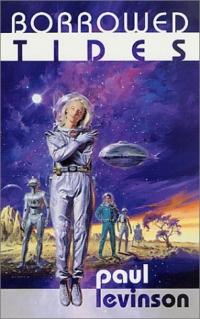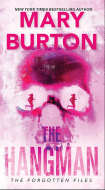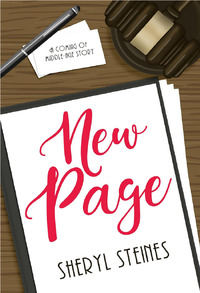 A LETTER TO THE LUMINOUS DEEP |
 April's Affections and Intrigues: Love and Mystery Bloom |

Purchase
Tor Science Fiction Excerpt of Borrowed Tides by Paul LevinsonChapter One The white birches and slender oaks were the corner's last stand. They fell in the spring of 1964 to bulldozers and brusque men—a construction crew clearing the last of the lot on Bronx Park East for the high-rise that Aaron Schoenfeld would soon be inhabiting. Aaron surveyed the rubble with mixed emotions. His apartment would have a terrace that jutted way out over the park—"a view straight to the Hudson," his father had been telling everyone. There would be two bathrooms—no more waiting for his sister to stop staring at her face in the mirror. He liked all that. But he didn't like what happened to the trees. "The people who used to live here said there were moon spirits in those pale trees," a quiet voice said to Aaron. He turned to see a kid with burnt-brown eyes. "People?" Aaron didn't usually have conversations with kids this young. The kid looked to be about ten or eleven, three or so years younger than Aaron. The kid sounded much older. "Yeah, Indians," the kid said. "Years of Indian history are being wiped out here." "How do you know there were Indians right here? I don't see any teepees." Aaron was instantly sorry he'd said that. He could see the kid struggling with whether to walk away from him or share his secrets. And something about the kid's intensity made Aaron want to hear more. The kid reached into his shirt pocket and pulled out a few pieces of chipped, flinty stone. "Arrowheads," he said, "made by the people whose main lands wereinPelham Bay. I found them right here." "How'd you know to look here?" Aaron asked. "I mean, even before this construction, it was just a—" "I could see the signs," the kid said. "I live right down the block." He pointed to a small semidetached house, with a big off-white hibiscus in front that looked like it had been watered by every mutt in the neighborhood. "This place was my backyard. I spend a lot of time here." "Did you tell anyone about the arrowheads?" "Who'm I gonna tell?" The kid gestured to the construction crew, just about packed up and ready to leave for the day. "I tried to talk to the foreman once, but he laughed in my face. Why should anyone pay any attention to what I say?" "Well, I am," Aaron said, surprising himself and extending his hand. "I'm Aaron Schoenfeld." The kid shook it with a tight grip. "Jack Lumet." He smiled for the first time. Aaron could tell this was a rarity. "The only reason you're even listening to me is that you're not much older than I am," Jack said. "You're a smart kid," Aaron said. "It's not that I'm against tall buildings or stuff like that," Jack said. "I just wish they could build these things where they don't hurt what's already here." Aaron thought about the birches. He thought about a spring afternoon years earlier, when he was four or five, and saw a crew building part of the Bronx River Parkway. He'd cried when he saw them blast away a field of buttercups. "Don't worry—they'll plant new ones," his father had said. But new ones—deliberately planted ones—weren't the same. They lacked something of wildflowers. Aaron understood that day what Jack Lumet was saying. But he also knew that he was very much looking forward to seeing the Hudson from his terrace, looking forward to the clearer view of the stars that he imagined his new outpost would provide. And if his high-rise weren't built here, where else? Everywhere you looked, there was something that people wanted to keep, didn't want to build over. In the spring of 1964, wildflowers were still in long supply in the Bronx. Aaron ran into Jack maybe once or twice a year after that— usually on that corner of Bronx Park Towers where he lived. He never knew what to say on those occasions. Usually hi, how're you doing, OK, you? all right, I guess, and the wind's howling down the block and they're shivering and they'd better both be on their ways. But Aaron always knew that Jack had some sort of drama percolating in his head, some take on the universe that Aaron would have wanted to hear if only he could have figured out some common ground, some pretext for the two of them to talk. But he also knew he had too many other important things to do, too many life-and-death crises— impress that girl, finish this report, impress that girl, deal with his parents, impress that girl, respond to that insult, impress that girl—erupting on an almost daily basis as he was growing up in those years. Aaron went on to City College. He started as a bio major, until the smell of fetal pigs at eight in the morning gagged him out of biology. Then on to psychology, and what made people, not pigs, tick. But Freud didn't satisfy, so Aaron drifted into sociology, where he hoped he could write some papers on the Beatles. He finally wound up with a Ph.D. in philosophy of science and an uncanny capacity to dazzle the crowd with quotes from Kant, Nietzsche, and Russell. An easy path to a safe professorship. But Aaron thought that maybe he'd picked up some important insights along the way. Jack had turned up at City College too, though his emergence as a scholar followed no such meandering course. To everyone he met, Jack talked the same thing: Indians. He studied Indians in the anthropology department. He gave lectures on Indians to New York City schoolkids. He showed up naked at a departmental party one night, dressed like the people who originally lived there, he'd said. Aaron heard about this from a girl he'd talked into having dinner with him. He burst out laughing and said good for Jack; the girl said they both were perverts; that was the last he saw of her. Jack came out with a small book a few years later— Native American Legends in New York City. Aaron saw a one- paragraph review of it in The New York Times. He'd intended to buy' it. But he never saw it in the bookstores. And that was the last Aaron heard of Jack for a long time. He was nowhere to be seen in the new millennium. Neither on-line nor at any of the scholarly conferences Aaron regularly attended. Jack was certainly close to the last person on Earth Aaron ever expected to see at any of the desperate meetings he'd been chairing in the space station off Mars. Aaron was an unlikely director for a less likely project. His article "Philosopher Speaks on Behalf of Space Exploration" had made a big impact in Spired—more than two million e-mails raged in reply and debate within twenty- four hours of its publication. The president of the United States had seen it. The president had a taste for philosophy. The president personally phoned Aaron and asked if he'd like to serve on a task force in preparation for a possible mission to Alpha Centauri. Aaron didn't have to be asked twice. But five years later, Aaron and his people were worried. The Connelly administration was on the verge of shelving the project. Two prior chairs of the task force had already quit. Now Aaron was in the hot scat. "Joe's absolutely firm on this," Naomi Senzer, the president's liaison, told the assembled team. "He says he's stuck out his head far enough already." Alexei Primakov grunted. "He sure ain't JFK." "He's better," Aaron replied, though he shared every bit of the Russian's frustration. "JFK had the Soviets— your grandparents—to compete against. JFC has a peachy, cooperative world, on the surface. Everyone claims to be happy with it. Hard to wring support out of Congress in that kind of environment." The demons of the twenty-first century, Aaron knew, were inner, panhuman, far more difficult to oppose with science and funding than had been Communism. "Indeed," Naomi said. "So if we do this at all, we'll have to make do with just what we have." "Which gives us a one-way trip to Alpha," David Percival, Aaron's chief assistant, said. "Which means we do it either nonpersonned, or as a ticket to oblivion." * * * Aaron shuffled through his papers and his options that night. Neither contained anything new. Most people knew that Alpha Centauri was the closest star system to Earth's own. Fewer knew that its distance, from Sol was about 4.3 light-years. Even fewer knew that it was actually a triple star—and that Alpha Centauri A was a G2 V star, just like the sun. Next to no one knew of the coincidence that had come about in 2016. Alpha Centauri C—the faint M5 star aptly named Proxima because it for some time had been the closest of the three to Earth—suddenly seemed to switch positions with Centauri A and B, bringing the Sol-type star closer to Earth than before. And lo and behold, when the Hubble II stared at this star in its new position, it saw what could have been an Earthlike planet or two circling around it. This was a surprise—Tau Ceti had previously been deemed the closest star likely to have worlds, and the evidence for its planets was still very inconclusive. But seeing via the Hubble was believing, even if what was seen was little more than a trace on a screen, a smudge of suggestion. Meanwhile, almost to the day that the Hubble began looking at Alpha Centauri A in a new light, Lawrence Livermore/Microsoft Labs announced to the president's secret committee that they had developed a hybrid chemical/fusion drive that could move a spaceship faster than any heretofore known, at a cumulative velocity of .48 speed of light in deep space. The upshot: Alpha Centauri A, a star with as good a chance as any at cooking up Earth-type life, was suddenly just a little more than eight years' travel away from humanity. A pittance in time, for species and solar systems. The catch: The LL/M drive required enormous amounts of fuel to achieve its initial speed, make the trip to Centauri with any necessary adjustments along the way, and decelerate once there. It presumably would need at least an equal amount of fuel to make the trip back home. Not only was that amount of fuel beyond any budget that Congress or even a global consortium was likely to approve, it was also quite beyond the capacity of any conceivable holding tanks to hold—especially traveling at half-light speed. The result: By the year 2021, it was becoming clear to even the most starry-eyed enthusiasts that humankind had perhaps been dealt a maddeningly frustrating hand in the matter of Alpha Centauri. Humanity apparently now had the capacity to travel to this nearly unblinking star. Period. One way. Aaron finally put down his papers and rubbed his eyes and thought what he always did before drifting off to sleep these days: He had no intention of letting this get in his way. "Tea brewed at .78g is a true delight," Aaron said, and passed a cup to Naomi the next morning. Devotees of the beverage on Mars Vestibule space station had been quick to discover this. "Water under pressure permeates the tea leaves more thoroughly at our lower gravity," Aaron added. "Ah, yes, pressure as friend, pressure as foe," Naomi said. "A double-edged sword." She held up the glass cup of tea to the sunlight that poured through the real-view window in Aaron's office, as if she were measuring the refraction of its rays. "What's the point of pressuring the president when we already know that even if we had the money, we couldn't do the trip?" she asked, her tone suddenly changing from philosophic to prosecutorial. She placed the tea on the table without drinking, and looked straight at Aaron. "It gives our group something to focus on," he answered. "And we need the time to come up with a solution to the fuel problem." "You have any ideas?" "Plenty," Aaron said. "But what we need are solutions. Here." He pushed a printout of a paper across the table to her. "What do you think of this?" Naomi leafed through the paper, eyebrows arched. "This guy's a specialist on Native Americans," she said. "Why the hell should we pay any attention to his theory about the stars?" "Because his theory addresses the nub of our problem," Aaron replied. "So the Iroquois had a notion that the currents between our sun and the star cluster we call Alpha Centauri—whatever they may have meant by `currents'—were the same as the currents in the Hudson River, the river they said flowed both ways. You really want me to tell this to the president?" "A search of more than two hundred years of logged publications on Combinets came up with nothing better," Aaron said. "In fact, it came up with nothing that really could be useful to our problem at all, other than the possibilities presented in this paper." "It's likely nonsense," Naomi said. "What good is that?" "What if it's not?" Naomi shrugged. "The paper's more than fifteen years old. Is this guy still around? Can we talk to him?" Aaron smiled. "He's due here in about an hour." Mars Vestibule shimmered like a spider's web in a moonlit field. A hundred little compartments hummed with information and life—the fragile cutting edge of enduring human penetration of the cosmos, a result of the brief powerful fluorescence of space urge in the twenty-first century. Its inhabitants yearned with an inspiration surpassing that of any insect population to expand this human web ever farther. But the task was enormous. Webs don't fly. Even when humanly spun in synchronous orbit around Mars. Jack Lumet walked with a scowl on his face into one of the glittering rooms. He moved as if he were tiptoeing on oil-slicked ice back in the Bronx—a common reaction of those who were new to low g. "You look good, Jack." Aaron stood up and shook his hand. "In fact, you look great for, what are you now, sixty-eight?" Jack also looked as intense as ever, only now the face was topped with singed gray rather than ink black, more than six decades in the smoldering. Jack nodded. "A long way from Bronx Park East to Mars Vest, isn't it?" "What were the odds that the two of us would have made it," Aaron said and motioned Jack to a seat. "This is Naomi Senzer"—the two exchanged hellos—"and you already know why we're here. Basically, we'd like you to tell us about your Hudson River theory." "It's not a theory as far as the Hudson River is concerned," Jack said. "It's a fact that the Atlantic Ocean current is so strong that it flows well past Tarrytown. And of course the Hudson River, like all rivers, flows back to the ocean. So it's a river that flows both ways. And the people who originally lived along its shores noticed this." "Right," Naomi said. "But what can you tell us about the Iroquois theories of star currents? I assume those were indeed theories, not facts." Jack ignored the sarcasm. He had spent a lifetime preaching the wisdom of Indians to skeptical audiences. Likely it was the only time he was really happy, Aaron thought. "You know, Native Americans had notions of the stars that were not all that different from the star stories of other peoples," Jack said. "The Algonquins, who lived near the river with the Iroquois, saw a bear chased by hunters in the same place the Greeks saw the Great Bear and we see the Big Dipper. And the Greek explanation of the Centaur— which contains your Alpha Centauri star—has lots of resemblances both to subcontinent Indian myths and to the stories of the Iroquois. Though, as I pointed out in my paper, the Iroquois stories go a bit further." "When in their history did the Iroquois come up with their cosmology about Alpha Centauri?" Naomi asked. "Legend is pretty specific about that—an oddity, since Native American mythology was obviously oral, and so not easily traceable. But according to my research, an Iroquois sachem by the name of Wise Oak first said that the currents flow both ways not only in the Big River—the Hudson—but in the Big River to the star cluster that we call Alpha Centauri. That would be about fifteen hundred A.D." "And how exactly did Wise Oak come to know this?" Naomi pressed. Jack looked at her—his frown replaced now by a full smile, an event Aaron still had the feeling was as infrequent in appearance as Halley's comet. "He claimed to have traveled there," Jack replied. "Ah. I see. Pity you didn't mention that in your ridiculous paper, Dr. Lumet. Would have saved all of us a bit of time." Naomi tossed her copy of the paper in Jack's direction and stalked out of the room. It made a graceful, air-glider arc in the low g, and landed on Jack's lap with a pirouette. Excerpt from Borrowed Tides by Paul Levinson |
|
| |||
|
||||



 © 2003-2024
© 2003-2024